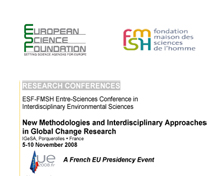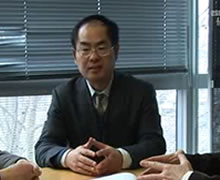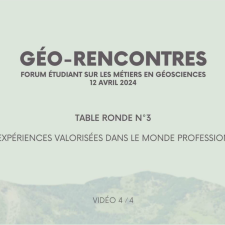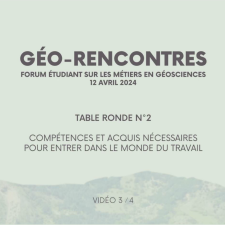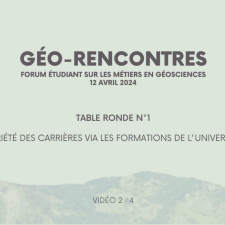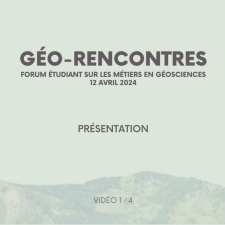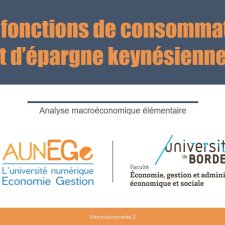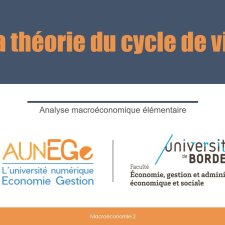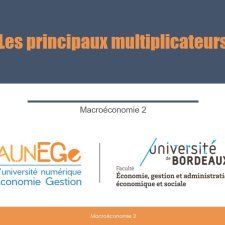Chapitres
Notice
Climate Models: learning from the Past Long-Term Climate Variability
- document 1 document 2 document 3
- niveau 1 niveau 2 niveau 3
Descriptif
Projections of future climate change rely on global climate models. Such models simulate the dynamics and physics of the coupled atmosphere-ocean system and move towards models of the full Earth system. These models are evaluated on the present day mean climate as well as on climate variability over the last century. Although climate models agree on the overall patterns of future climate change, discrepancies are still displayed between models, both in amplitude and at the regional scale (e.g., IPCC AR5 (2007)).
Past climates offer an unique opportunity to evaluate climate models on climate conditions different from the present-day conditions thanks to the reconstruction of past climates from paleodata (past vegetation, sea sediments and ice cores). They also allow to investigate the mechanisms of climate change and the importance of feedbacks in the climate system.
The Paleoclimate Modelling Intercomparison Project, endorsed by both the international programs WCRP and IGBP, focuses on these issues (http://pmip2.lsce.ipsl.fr/). Main focus is on the last glacial maximum (LGM), ca 20 000 years before present (BP), and the mid-Holocene, ca 6000 years BP. The LGM simulation allows to examine the climate response to the presence of large ice sheets, cold oceans and lowered greenhouse gas concentrations. The mid-Holocene simulation allows to examine the climate response to a change in the seasonal and latitudinal distribution of incoming solar radiation caused by known changes in orbital forcing.
Results show that the models used for future climate change projections are able to simulate the broad-scale features of both the LGM and mid-Holocene climate but that they tend to understand some of these features such as the polar amplification at the LGM and the northward extent of the African monsoon at the mid-Holocene. Debate however still prevails with regards to the change of the thermohaline circulation at the LGM. Paleoclimate modelling studies have also emphasized the importance of vegetation feedbacks at the regional scale, not yet included in future climate change studies. Other challenging issues with regards to future climate change are offered by long-term paleoclimate modelling studies such as ice-sheet melting at the last interglacial and during the last deglaciation, and understanding the past carbon cycle changes as inferred from ice cores.
Intervention / Responsable scientifique
Dans la même collection
-
Holocene Climatic Changes and Their Effect on Morphodynamics and Sedimentation in Campania
AmatoVincenzoHigh-resolution paleoclimatic studies (e.g. 18O, 13C, CH4, MS, ect) provide 38 detailed reconstructions of the Holocene climatic variability, but they don’t are unable to provide direct informations
-
The State of UK Climate Modelling
FisherJoshuaThe UK recently invested £23 million (~US$40 million) in a program in Quantifying and Understanding the Earth SysTem (QUEST). The final product of this investment is the state-of-the-art QUEST Earth
-
Climate, Geography and Macroeconomics: Revised Data, Refined Analysis and New Findings
FüsselHans-MartinAssessments of social and economic impacts of climate change are primarily based on the results of biophysical climate impact models, which are aggregated, extrapolated and/or valued in monetary terms
-
The Effect of Thermal Pollution on Benthic Foraminiferal Assemblages, in the Mediterranean Shore Fa…
ArieliRuthieOver the past several decades public and scientific awareness to global warming has increased significantly. As a result, many studies have examined the affects of global warming. However, the
-
International Negociations on Climate Change: How to Take Advantage of Risk Aversion to Improve the…
ThoronSylvieClimate change is one of the best examples of global environmental problems. Countries are conscious that they have to find a solution to this global problem at the international level. Negotiations
-
IPCC Working Group I
SomervilleRichardThe European Science Foundation (ESF) and the French Foundation of the Maison des Sciences de l’Homme (FMSH) (within the Entre-Sciences programme) have agreed to jointly develop a new conference
-
Conference Opening
GuiotJoëlLauberVolkmarThe European Science Foundation (ESF) and the French Foundation of the Maison des Sciences de l’Homme (FMSH) (within the Entre-Sciences programme) have agreed to jointly develop a new conference
-
Cross-Disciplinary International Research on Land-Atmosphere Interactions
ReissellAnniThe presentation will focus on scientific issues of importance to global change and climate change research: interactions of reactive trace and greenhouse gases between the biosphere and atmosphere in
-
Regional Climate Change and Extremes
DéquéMichelGlobal coupled ocean-atmosphere models, driven by greenhouse gas concentrations according to several hypotheses for the next century, have been used in the last IPCC-AR4 report to depict possible
-
Recent Trends and Vulnerabilities in the Carbon Cycle
CiaisPhilippeWe shall address the coupling between atmospheric circulation and the modelling of ecosystems, to have a better understanding of the carbon cycle, perturbed both by land use and Climate Change. The
-
Interlocking Natural and Social Systems - Resilience, Governance and Research Policy Considerations
SvedinUnoIn this presentation the start is made from the 2007 IPCC statement that it now seems consolidated that there is a clear sign of the importance of the anthropogenic factors in the climate change
-
Carbon Offsetting: An Ethical and Psychological Approach
FragnièreAugustinThe carbon offset market is becoming more and more popular. However, 57 until now few studies have attempted to approach the phenomenon from a social sciences’ perspective. By distinguishing three
Avec les mêmes intervenants et intervenantes
-
Round Table
JoussaumeSylvieChanzyAndréSomervilleRichardDuvalRomainThe European Science Foundation (ESF) and the French Foundation of the Maison des Sciences de l’Homme (FMSH) (within the Entre-Sciences programme) have agreed to jointly develop a new conference
-
Debate
JoussaumeSylviePlantonSergeGonzales RoucoJesus FelipeGoosseHughesReissellAnniBrasseurGuyThe European Science Foundation (ESF) and the French Foundation of the Maison des Sciences de l’Homme (FMSH) (within the Entre-Sciences programme) have agreed to jointly develop a new conference
-
IPCC Working Group I and III
JoussaumeSylvieThe European Science Foundation (ESF) and the French Foundation of the Maison des Sciences de l’Homme (FMSH) (within the Entre-Sciences programme) have agreed to jointly develop a new conference
-
Simulations, scénarios et prospectives
JoussaumeSylvieGodardOlivierPlantonSergeGilletMarcKubskyStefanAndréJean-ClaudeEn réunissant des scientifiques, des experts du Groupe intergouvernemental d'étude du climat (GIEC), des représentants d'administrations et d'institutions de diffusion de (information scientifique, le
Sur le même thème
-
Géo-Rencontres 2024 / Les expériences valorisées dans le monde professionnel
LilloEmmaAraujoJulieHuartFlorianDubreuRomainBuquetDamienChazalLauraBorieMarianeForum sur les métiers en géosciences organisé par les étudiants du CMI Ingénierie Géologique et Civile, Université de Bordeaux, 12 avril 2024
-
Géo-Rencontres 2024 / Compétences et acquis nécessaires pour entrer dans le monde du travail
BrinonJulietteAmoleFili-FenuaPretouFrédéricCampetHugoLiébauxAlbinDe AlemeidaMarie-LouPoirierAymericDufrenoyAudreyForum sur les métiers en géosciences organisé par les étudiants du CMI Ingénierie Géologique et Civile, Université de Bordeaux, 12 avril 2024
-
Géo-Rencontres 2024 / Variété des carrières via les formations de l'université
InguimbertDianeLacazeRomaneLemaitreLaurieChazalLauraMontjeanPascalPoudevigneJacquesPortefaixFrédéricForum sur les métiers en géosciences organisé par les étudiants du CMI Ingénierie Géologique et Civile, Université de Bordeaux, 12 avril 2024
-
Géo-Rencontres 2024 / Présentation
LatasteJean-FrançoisLavieThéoForum sur les métiers en géosciences organisé par les étudiants du CMI Ingénierie Géologique et Civile, Université de Bordeaux, 12 avril 2024
-
Tokyo, plus grande « ville » au monde : aménager et gouverner la démesure
Languillon-AusselRaphaëlAvec ses quelques trente-cinq millions d’habitants, Tokyo est la « ville » la plus peuplée au monde, et l’une des métropoles les plus riches. Cette présentation vise à décrire, analyser et expliquer,
-
Les fonctions de consommation et d’épargne keynésiennes
Maveyraud-TricoireSamuelLes fonctions de consommation et d’épargne keynésiennes
-
La détermination du PIB à court terme
Maveyraud-TricoireSamuelLa détermination du PIB à court terme
-
Demande en biens et services et fluctuations conjoncturelles
Maveyraud-TricoireSamuelDemande en biens et services et fluctuations conjoncturelles
-
-
-
Les propensions à consommer et à épargner
Maveyraud-TricoireSamuelLes propensions à consommer et à épargner
-
Le marché des biens et services à court terme
Maveyraud-TricoireSamuelLe marché des biens et services à court terme



